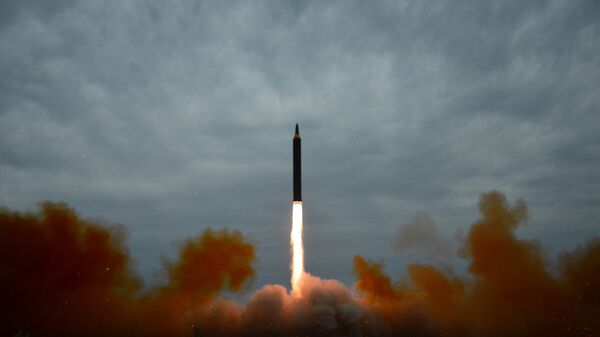The missile's apogee was "higher, frankly, than any previous shot they have taken," Mattis told reporters.
North Korea has the capability to strike "everywhere in the world basically" with their ICBM technology developments, the Pentagon chief said. The missile flew at least 10 times higher in space than the orbit altitude of the International Space Station and could have a range of 6,500 miles if it had flown on a standard trajectory, according to Yonhap. The ISS orbits roughly 250 miles above earth.
The missile is believed to have been an intercontinental ballistic missile, a Pentagon spokesman said Tuesday. The projectile traversed 1,000 kilometers (620 miles) before splashing down into the Sea of Japan. The South Korean military responded to the provocation by conducting a "precision strike" missile drill immediately afterward.
Earlier on November 28, Japanese and South Korean officials noticed an increase in radioactivity data suggesting another missile test might be imminent. "North Korea might launch a missile within the next few days," a Japanese government official told local media. Just hours later, their predictions provide correct.
The Pentagon has assessed that the missile was launched from Sain Ni. Japanese broadcaster NHK reports that Japan's government believes the missile flew for 50 minutes and landed somewhere within the waters claimed as its exclusive economic zone.
US President Donald Trump was briefed on the launch while the projectile was still flying, the White House said.
Early indications are that #DPRK missile fell into the sea near Japan. More detailed analysis to follow as soon as we have reliable, verifiable information.
— DEFCONWarningSystem (@DEFCONWSALERTS) November 28, 2017
Seoul's military has been "closely monitoring" and "tracking possible North Korean provocations" with US partners, a spokesman for the army said Tuesday. According to BNO Newsroom, Japan has confirmed the missile launch but did not issue an emergency alert to the country's residents. Previous tests have featured North Korean missiles flying over Japan.
North Korean officials threatened this summer to strike Guam in the event of a pre-emptive strike by US, South Korean or Japanese forces, but tensions cooled over the past few months as the Trump administration shifted from threatening to attack Pyongyang to urging diplomacy.
"Diplomacy remains the preferred way" to deal with North Korea, US Defense Secretary James Mattis said October 29.
The launch marks the first time North Korea has provoked the US and regional nations since US President Donald Trump labelled Pyongyang a state sponsor of terrorism. South Korea, Japan and the US, however, seemed to continue military drills in the land and water surrounding the isolated nation during its testing pause.
Professor at Tokyo Institute of Technology: North Korea is constantly upgrading its technology and has now reached a level where, in my estimation, it no longer needs to carry out nuclear detonations to test and develop the relevant weapons.
— InsideNK (@inside_nk) November 26, 2017
The US and South Korean militaries are slated to hold more large scale military drills from December 4 through December 8. The drills will feature more than 230 allied aircraft swarming around the Korean peninsula.
China and Russia have stepped up their own efforts to deter North Korea. Russia cannot accept Pyongyang's "missile and nuclear gambit," Foreign Minister Sergey Lavrov said November 24, since these programs violate United Nations Security Council resolutions. With China, Russia insists that Pyongyang follow through on the "implementation of other provisions of these resolutions that require the resumption of talks," Lavrov said.





